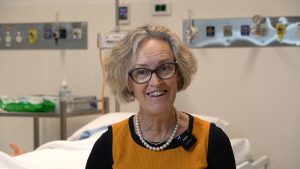Doctors are seeing something new in pain clinics – a syndrome called Munchausen’s by internet.
Central Adelaide Local Health Network (CALHN) psychiatry registrar Dr Trushna Murgahayah presented a medical talk on the syndrome recently at the Australian and New Zealand College of Anaesthetists’ Faculty of Pain Medicine Spring Meeting in Adelaide.
“Patients present with symptoms they have extracted from the internet in hopes of obtaining certain treatment or getting a particular diagnosis,” Dr Murgahayah said.
“However, the source of their information is often social media and online forums, which have not been regulated by health practitioners.”
The pros and cons of online support
Since the COVID-19 pandemic, patients have increasingly turned to the internet to seek support regarding their medical conditions.
Dr Murgahayah said the creation of online groups encourages patients to get together and exchange information.
In Munchausen’s by internet, a person typically joins an online support group for people with a serious health or chronic pain condition, and then claims to have the illness themselves.
Examples include users of social media self-diagnosing with attention-deficit hyperactivity disorder (ADHD) after watching TikTok videos, trying to obtain analgesic medications for pain relief when it is not clinically indicated, and at times feigning medical symptoms to get ongoing treatment.
And the risk can work in the reverse direction too.
“Real, vulnerable patients in online groups can be exploited or fed misguided information from someone who has Munchausen’s by internet,” Dr Murgahayah said.
Rising global trend
The term Munchausen’s by internet is adapted from the better-known Munchhausen’s syndrome, where a person fakes illness to gain attention and sympathy.
Dr Murgahayah said the rising incidence of Munchausen’s by internet presents a challenge to clinicians, especially with increasing social media use.
“It is a rising trend worldwide and social media has made information available to all without any regulations in place,” Dr Murgahayah said.
“It is crucial to redirect our patients to validated online resources that are available for pain management.”
Dr Murgahayah is a final year psychiatry registrar at CALHN, and undertaking an advanced certificate in consultation-liaison in psychiatry.
Photo by Christin Hume on Unsplash



